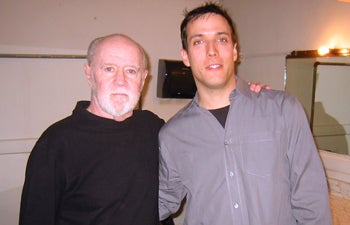To Wit
When Rob Paravonian opened 12 shows on comedy titan George Carlin’s final tour across the country, he waited until the seventh show before asking to take a photo together. Paravonian didn’t want to come off as a fan boy, he said. He wanted to be professional and wanted to be thought of as a comedian more than a fan.
“I said it was to prove to my Mom that I was really doing this gig.”
That was one of Paravonian’s best memories of comedy performance, from a career that began right here at USC. The Waukegan, Illinois, native was a freshman when he heard about a comedy contest happening at Café 84 on the University Park campus — that very night. He signed up despite the short notice.
“In high school I tried to write funny things for the school paper and did a little theater, but it was [at USC] that I first did standup. It was pretty bad because I had no material, but something about it really appealed to me, the challenge of going onstage and trying to be funny.”
The following year he saw a notice for the contest a week in advance and had time to write some material. That was the first time he got a few actual laughs for planned remarks, he said, and he was hooked. Paravonian started doing open mic nights and standup around Los Angeles regularly, and got better and better at it. Soon he integrated his acoustic guitar into his comedy act.
“When I did standup, I would always bring my guitar along because there was usually a long wait until performance time,” he said. “I’d play to kill time or goof around with the other comics. Sometimes when I played silly songs, they’d suggest I try them on stage that night. So music got incorporated fairly early on, and it seemed like a natural connection, since I’ve played music my whole life.”
Paravonian played the cello from the age of six through high school, and at 13 he began teaching himself guitar. This eventually led to one of the comedian’s more famous bits — a performance called “Pachelbel’s Rant.” In it he laments, while playing the acoustic guitar, the utter monotony of the cello part for “Pachelbel’s Canon in D” and, more generally, the song’s annoying ubiquity. The video went viral on YouTube, with 11.5 million views to date. More recently, and in a similar vein, his video series “Who Charted?” playfully lambasts chart-topping pop songs by the likes of Katy Perry, Justin Timberlake and Ariana Grande.

Rob Paravonian, right, poses with the late comedy legend George Carlin. Photo courtesy of Rob Paravonian.
For the past 20 years, Paravonian has been based in Brooklyn, New York, where he performs, writes and produces music for television, film and the Web. He’s traveled to every U.S. state (there’s an interactive map on his website that charts all of his travels), and in 2005 he entertained military personnel at bases in Afghanistan during a two-week tour. He’s appeared on Comedy Central, VH1 and Dutch public television, and in 2009 he opened for comedienne Lily Tomlin at the MGM Grand in Las Vegas.
Recently, he’s been more focused on comedy writing, working on everything from one-act plays and one-man shows to material for a sketch comedy group. At the moment, he’s combining his love of words and notes by developing a full-length musical.
“It’s about a kid who is the least-known member of a very popular boy band. He gets traded by his unscrupulous manager to a no-name boy band, so he has to basically give up his life of pop stardom privilege and start over. It’s meant to be a fun, satirical look at pop music.”
Working with language has always been central to Paravonian’s craft. At USC, once he discovered that creative writing “was a degree people could actually get,” he chose it for his major. He enrolled in several fiction workshops with Writer-in-Residence and Distinguished Professor of English T.C. Boyle.
“I loved the way [Boyle] ran his workshops,” Paravonian said. “They really taught you how to write effectively, because the only way to know if the idea you’re trying to get across is getting across, is by presenting it to people and hearing what they think. Comedy is storytelling, basically, and you need to be open to and aware of people’s reactions to see how well you’re telling it.”
Paravonian says he loves taking an analytical approach to standup where, when the idea for something funny arises, you have to figure out the most efficient way to present it to an audience so they see the humor and come along with you.
“Sometimes it comes down to, ‘Is this word funnier or should I use this word?’ It’s fun to get that precise about it. When it’s done really well, nothing is wasted and you can really home in on trying to get the most funny out of an idea. Standup is very creative, but there’s an analytic component that has always appealed to me.”